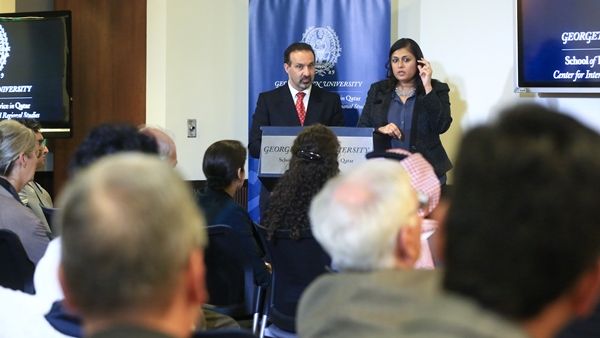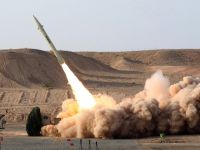Exploring Dubai’s Indian diaspora at a Georgetown public lecture

Visiting professor at the faculty of Islamic Studies at HBKU in Doha, Neha Vora, was a guest speaker at a distinguished public lecture held at Georgetown University in Education City (GU-Q) to deliver a CIRS Monthly Dialogue on the topic “Impossible Citizens: Dubai’s Indian Diaspora.”
In her lecture, Professor Vora touched on the key points of her book that shares the title of her presentation. Through her research and extensive interviews with the middle-class Indian business communities of Dubai, she painted a clear picture of how this community perceives their identity and their status in the city as economic migrants who have cultural and historical links to the city but who don’t necessarily desire permanent assimilation and citizenship. “Though Indians are technically temporary and in the Gulf solely for economic accumulation, I found bonds that cut deeper than in communities where people can naturalize such as my own Indian community in the U.S.”
This community also feels they are different than both low wage migrant laborers and higher-paid western expats, and proud of their contributions to the economic development of the city, she said. She gave the example of one of her research participants, Rohith, to illustrate her point. “Rohith preferred to live in Dubai, and had never actively pursued living elsewhere. His preference for the UAE over other countries is due to its cultural and geographical proximity to India, and its neo-liberal market he fiercely believed in, where anyone could achieve and succeed with hard work, and no one was beholden to the state with taxes and civic duties.”
Professor Vora's research, which was conducted at the height of Dubai’s economic growth in 2010, focused on how the middle-class Indian communities of Dubai have a strong sense of belonging despite the legal opportunity to gain citizenship or permanent residence. “Indians have practically zero access to any form of permanency in Dubai. They cannot naturalize, or even gain permanent residency”, she said, citing the Kafala system common throughout the Gulf region that ties people to their employment visas and sponsors.
“How is it that Dubai is such an established South Asian city when belonging for these migrants, in any official legal sense, is unavailable?” she asked. The answer, her research showed, is what’s referred to as “substantive” citizenship. “This type of unofficial citizenship is non passport based but sometimes creates even stronger community bonds than legal status can offer.” She described the many cultural links the Indian community shared with both Dubai and their home country, through language, food, clothing, and other cultural practices. Many Indians see the Gulf States as an extension of India. “In fact, Rohith insisted that his daughters, unlike me, were more authentically Indian and less sullied by westernization than Indians in the U.S. and the U.K,” she explained.
She concluded by explaining that even though Dubai still largely retains its South Asian character, the westernization of the city through gentrification of formerly lower middle class neighborhoods and the successful push to attract western resident expats and tourists, has left the Indian community feeling very job insecure, with concerns about what the future may bring.
Dr. Mehran Kamrava, Director of the Center for International and Regional Studies (CIRS) at GU-Q, which hosts the Monthly Dialogue Series lecture, said: “Professor Vora's research into Dubai’s South Asian expat community is an important addition to the body of work on the Indian diaspora, and her presentation was a valuable learning opportunity for our students and guests.”
An Assistant Professor of Anthropology at Lafayette College, Neha Vora is currently in Doha working on a project that investigates the impacts of knowledge economy transformation and American branch campus expansion on Qatar.
Background Information
Georgetown University in Qatar
Established in 1789 in Washington, DC, Georgetown University is one of the world’s leading academic and research institutions. Georgetown University in Qatar (GU-Q), founded in 2005 in partnership with Qatar Foundation, seeks to build upon the world-class reputation of the university through education, research, and service. Inspired by the university’s mission of promoting intellectual, ethical, and spiritual understanding, GU-Q aims to advance knowledge and provide students and the community with a holistic educational experience that produces global citizens committed to the service of humankind.
Located in Doha’s Education City, GU-Q offers the same internationally recognized Bachelor of Science in Foreign Service degree as Georgetown’s Capitol Campus in Washington, DC. This unique, interdisciplinary program prepares students to tackle the most important and pressing global issues by helping them develop critical thinking, analytic, and communication skills within an international context. GU-Q alumni work in leading local and international organizations across industries ranging from finance to energy, education, and media. The Qatar campus also serves as a residency and delivery location for the Executive Master’s in Emergency and Disaster Management along with the Executive Master’s in Leadership.






